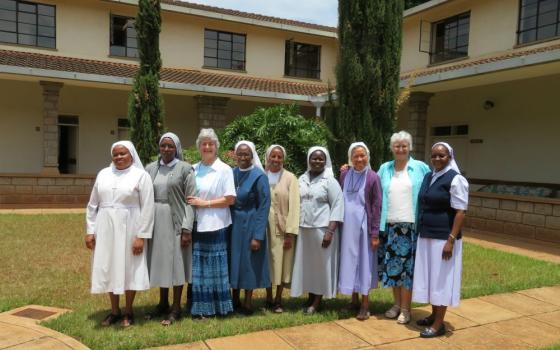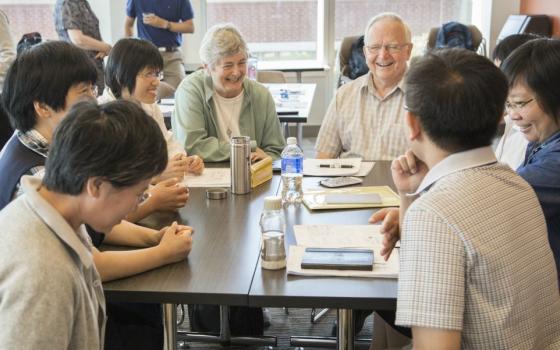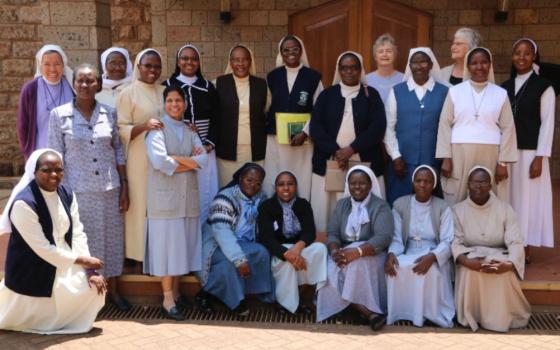At age 65, and as one of the "younger" members of an aging and shrinking congregation of women religious in the United States, I have found myself called and gifted to be part of emerging programs in leadership development for young sister leaders in China and East Africa. These experiences are part of my work at DePaul University in Chicago as director of Vincent on Leadership: The Hay Project* based on the leadership legacy of St. Vincent de Paul.
I have come to believe that this work is a call coming through the spirit and legacy of the original Vincentian saints, Vincent de Paul and Louise de Marillac, both of whom played key roles in the transformation of the sisterhood and priesthood in 17th-century France. Vincent founded the Congregation of the Mission (Vincentians) in 1625 and was heavily engaged in improving priestly formation, which had declined into a deplorable state in the church of his day. He and Louise co-founded the Daughters of Charity in 1633. Under their leadership, the Daughters defied tradition and became one of the first successful apostolic congregations, serving "in the streets" rather than living in a cloister.
My own work in recent years has included helping to develop and offer the Chinese Leadership Initiative, a summer leadership training program for native Chinese priests and sisters at DePaul University and traveling to China to assist a congregation of women religious with ongoing formation and a new constitution.
At the same time, I have been called to East Africa to play a role in bringing the dream of a leadership development program for women religious serving in congregational leadership "in Africa for Africans" to fulfillment. This program, held in Nairobi, Kenya, is attended by native African sisters as well as sisters from other parts of the world serving in leadership positions for their international congregations. In fact, at a 2016 workshop I offered, we discovered the participants and staff were from 11 different countries.
The gift of an expanded sisterhood
I have truly experienced the young women religious in China and East Africa as "sister," expanding a hundredfold my sense of the circle of women with whom I share religious life. We have all talked about how few are entering our communities after us — but I continue this work impressed, inspired and energized by their desire to grow as leaders, and by their choice to serve some of the most extreme human needs that exist in their part of the world.
As sister leaders, none of us knows what the future will bring. However, we do know the needs that exist now, not only for those we serve, but within our very congregations: the need for better leadership, for more honest and authentic communication, for more transparency, for more skill at balancing the tension between individual rights and the common good, for better stewardship of Earth's limited resources, for more compassion and forgiveness.
We want our lives, not just our works, to witness to the teachings of Jesus, who touched our hearts and drew us to follow him. Through my experiences in China and Kenya, I have come to love these women fiercely.
China
Some of the women's congregations presently in China existed before the Cultural Revolution of 1966-76, when the practice of religion was outlawed, congregations were disbanded, and foreign missionaries expelled. When passage of a constitution in 1982 resulted in a new religious fervor and allowed the practice of the world's five major religions, some former congregations were re-founded and others begun anew.
Some congregations are large — two or three hundred — while some are quite small, numbering fewer than 10 members. In congregations that have existed only since the 1980s or '90s, the majority of the members are in their 40s and 50s. They have had little formation since there were few, if any, older women who had lived as sisters prior to the revolution to guide them in the religious life. Even those who had somehow held onto their vocation during the revolution had experienced only pre-Vatican II formation.
To date, 83 sisters from more than 40 congregations have attended our four-week summer leadership program at DePaul. Since few of the sisters speak English, I have little opportunity to get to know many of them very well. However, we do learn through translators the impact of their Chicago experiences through presentations at the end of the program. I will never forget how one sister reacted to the personal freedom she witnessed in the United States. She now saw freedom as foundational to the process of growth in maturity. "When I go back, I will help my sisters to be free," she said.
Another sister recounted that the Chicago experience could be summarized in four themes: dying, renewal, resurrection and appearance. She said she felt she had been experiencing a "dying" in her leadership and community struggles, but that her experience in Chicago had been a form of "resurrection" for her. I was moved most profoundly by her next statement, in which she connected her own resurrection to that of Jesus: "Now it is my great responsibility to appear as the resurrected one. How can I do this through my daily life, not only to my sisters, but everyone around me?" The dedication and resiliency of these women trying to live consecrated life within a communist culture has touched me deeply.
Kenya
In November 2018, the final module of a three-module program called the "Certificate in the Practice of Organizational Leadership (CPOL)" was held in Nairobi, Kenya. Reaching this goal of creating a leadership program "in Africa for Africans" has been a four-year journey. For me, a significant blessing in this work has been to be among an international and multi-generational group of women religious leaders collaborating to make this dream come true.
The CPOL is the outgrowth of a partnership between DePaul University and Tangaza University College in Nairobi, Kenya, through Tanzaga's Centre for Leadership and Management (CLM). Through grants from the Conrad N. Hilton Foundation, the goal has been to identify and train a team of local facilitators to continue to develop a leadership program unique to the African context. **
I helped to provide leadership training for sisters in congregational leadership within Kenya by offering two five-day workshops in 2016. From the attendees at these and other workshops, 10 sisters were selected to become "Associates" of CLM, and they subsequently helped develop the new program modules. My role shifted to become a resource person and trainer for the CLM and Associate facilitators. During 2017 and 2018, I traveled to Kenya for practice sessions on each module as it was being developed.
At each of the practice sessions, I learned more about the struggles and joys the women religious leaders experience. At my first training session, I was paired with a sister to talk about what was "trending" for our generation at the time we entered religious life. I was unprepared for the story of her vocation discernment. She told me that prior to committing to enter her congregation, she struggled mightily with whether to become a sister or become a guerilla fighter in her country's war of independence, as many friends of the same age were doing. In the end, she chose religious life. She ended her story by sadly sharing that many of her friends who had become fighters had since died. Then, in stark contrast, it was my turn to share what had been trending for my generation in the United States: "disco music."
I also have been very impressed by the dedication of the team members to grow as presenters. They are taking what they learned in the leadership workshops, developing presentations with examples from their own leadership experiences, and incorporating insights and examples from the African culture.
In November 2018, at the completion of the third CPOL module, 21 congregational leaders from 18 congregations received their CPOL certificates — the first to complete the new program. Out of this group, another eight sister leaders have volunteered to be new Associates. I will return to Kenya in February to help with the training workshop for these new presenters.
My work in China and Kenya has truly touched me deeply. I am so grateful that I can help other sisters develop new approaches to leadership in their congregations and the Catholic Church. I feel confident that Vincent and Louise are proud of the work we are doing together.
[Patricia M. Bombard is a member of the Sisters of Charity of the Blessed Virgin Mary of Dubuque, Iowa. She has a doctorate of ministry, has worked in various capacities in the areas of business, politics, journalism and higher education administration, and taught at St. Xavier and Loyola Universities in Chicago. She is currently directing DePaul University's Vincent on Leadership: The Hay Project.]
* Editor's notes: The network system at DePaul University may deliver an error message when clicking the first two links in this article. Clicking "reset password" on the window that opens may allow you to view the intended page.
** The Conrad N. Hilton Foundation also funds Global Sisters Report.



